Unit7 In the future 第2课时 语法知识及拓展(课件)(共27张PPT)
文档属性
| 名称 | Unit7 In the future 第2课时 语法知识及拓展(课件)(共27张PPT) |
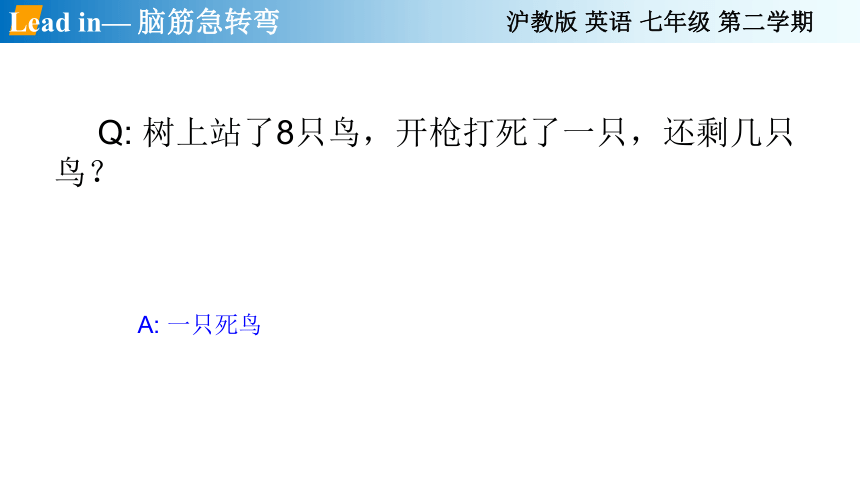
|
|
| 格式 | pptx | ||
| 文件大小 | 181.5KB | ||
| 资源类型 | 试卷 | ||
| 版本资源 | 牛津上海版(试用本) | ||
| 科目 | 英语 | ||
| 更新时间 | 2022-05-21 07:46:57 | ||
图片预览

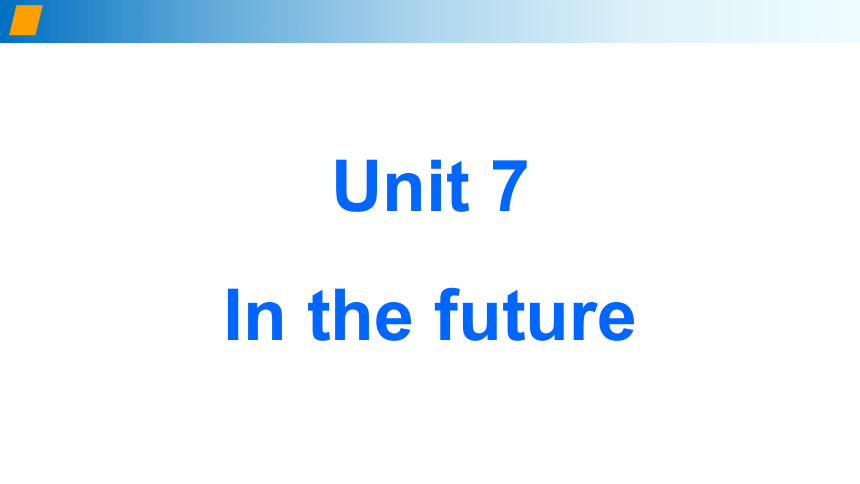
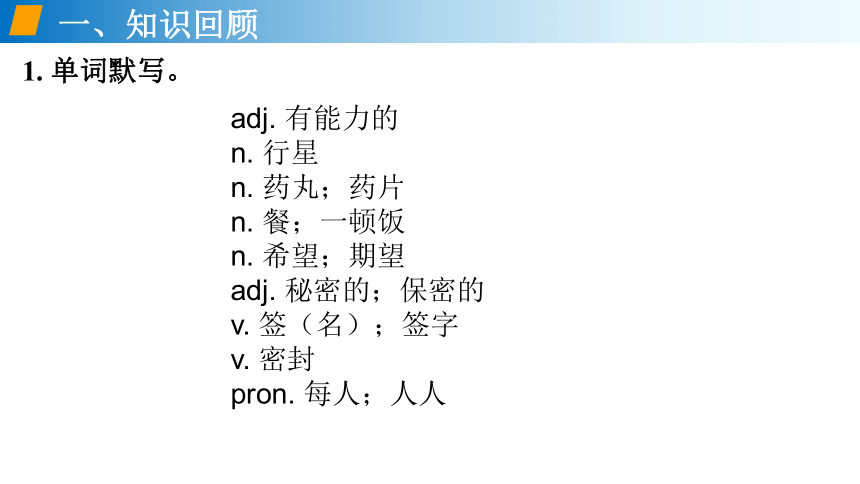
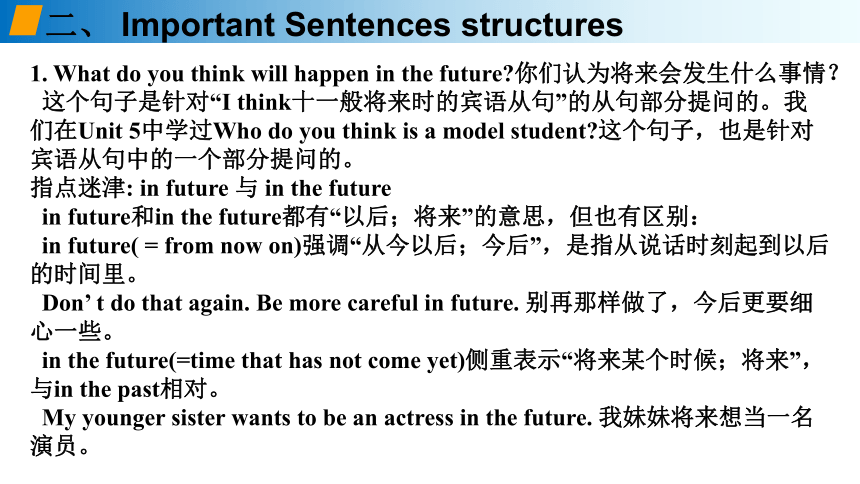
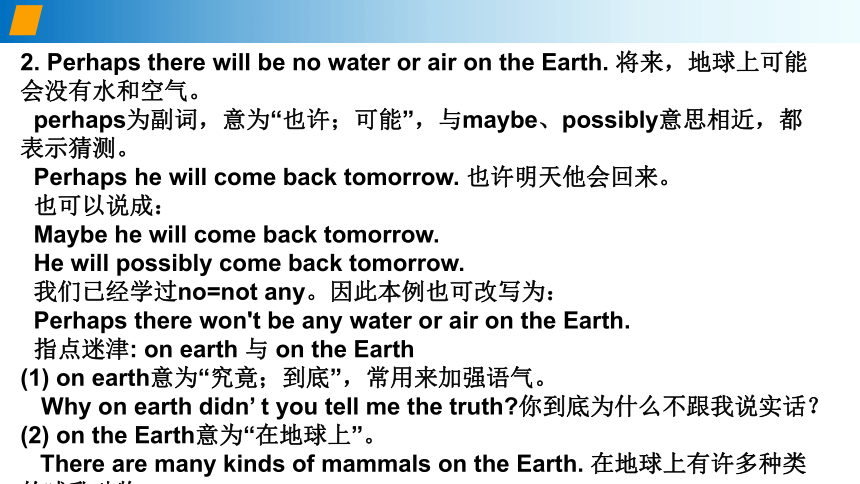

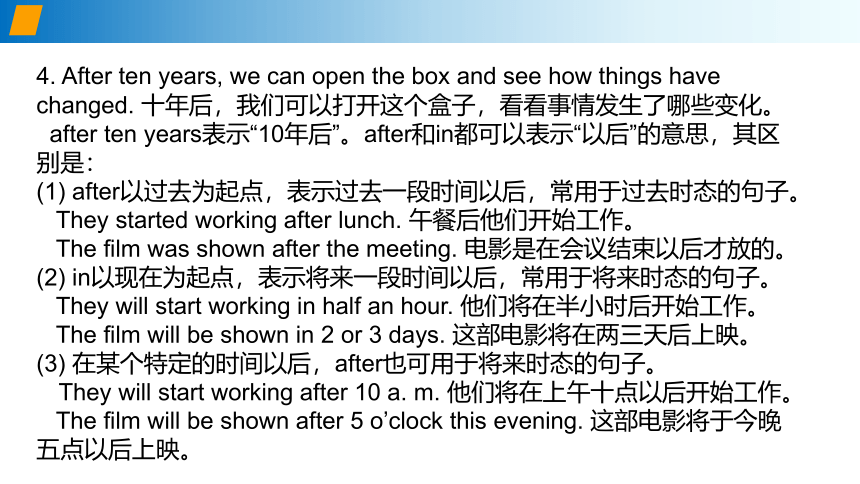


文档简介
(共27张PPT)
Q: 树上站了8只鸟,开枪打死了一只,还剩几只鸟?
沪教版 英语 七年级 第二学期
Lead in— 脑筋急转弯
A: 一只死鸟
Unit 7
In the future
一、知识回顾
adj. 有能力的
n. 行星
n. 药丸;药片
n. 餐;一顿饭
n. 希望;期望
adj. 秘密的;保密的
v. 签(名);签字
v. 密封
pron. 每人;人人
1. 单词默写。
二、 Important Sentences structures
1. What do you think will happen in the future 你们认为将来会发生什么事情?
这个句子是针对“I think十一般将来时的宾语从句”的从句部分提问的。我们在Unit 5中学过Who do you think is a model student 这个句子,也是针对宾语从句中的一个部分提问的。
指点迷津: in future 与 in the future
in future和in the future都有“以后;将来”的意思,但也有区别:
in future( = from now on)强调“从今以后;今后”,是指从说话时刻起到以后的时间里。
Don’ t do that again. Be more careful in future. 别再那样做了,今后更要细心一些。
in the future(=time that has not come yet)侧重表示“将来某个时候;将来”,与in the past相对。
My younger sister wants to be an actress in the future. 我妹妹将来想当一名演员。
2. Perhaps there will be no water or air on the Earth. 将来,地球上可能会没有水和空气。
perhaps为副词,意为“也许;可能”,与maybe、possibly意思相近,都表示猜测。
Perhaps he will come back tomorrow. 也许明天他会回来。
也可以说成:
Maybe he will come back tomorrow.
He will possibly come back tomorrow.
我们已经学过no=not any。因此本例也可改写为:
Perhaps there won't be any water or air on the Earth.
指点迷津: on earth 与 on the Earth
(1) on earth意为“究竟;到底”,常用来加强语气。
Why on earth didn’ t you tell me the truth 你到底为什么不跟我说实话?
(2) on the Earth意为“在地球上”。
There are many kinds of mammals on the Earth. 在地球上有许多种类的哺乳动物。
3. What do you hope will happen in ten years’ time 你们希望10年后会发生什么?
in ten years' time意为“在10年后”。本例中的介词in应翻译成“在……之后”,而不是“在……之内”。当in用在表示将来含义的句子中时,后面一般跟“一段时间”。in ten years' time=in ten years。
Tommy will be 20 centimetres taller in 15 years' time. 15年后,汤米将会(比现在)长高20厘米。
in ten years' time中的years’ 是名词所有格,意为“10年的时间”。
ten minutes’ walk步行10分钟的路程
three kilometres' distance三千米的距离
4. After ten years, we can open the box and see how things have changed. 十年后,我们可以打开这个盒子,看看事情发生了哪些变化。
after ten years表示“10年后”。after和in都可以表示“以后”的意思,其区别是:
(1) after以过去为起点,表示过去一段时间以后,常用于过去时态的句子。
They started working after lunch. 午餐后他们开始工作。
The film was shown after the meeting. 电影是在会议结束以后才放的。
(2) in以现在为起点,表示将来一段时间以后,常用于将来时态的句子。
They will start working in half an hour. 他们将在半小时后开始工作。
The film will be shown in 2 or 3 days. 这部电影将在两三天后上映。
(3) 在某个特定的时间以后,after也可用于将来时态的句子。
They will start working after 10 a. m. 他们将在上午十点以后开始工作。
The film will be shown after 5 o’clock this evening. 这部电影将于今晚五点以后上映。
5. We've entered a new century. 我们已经跨进了一个新的世纪。
当enter表示进入一个具体场所或加入某个组织而成为其中一员时,是及物动词,后面无需加介词。
She entered the room and closed the door. 她走进房间,关上了门。
China has entered the WTO. 中国已加入了世贸组织。
【拓展】 enter into也是“进入”,但后加抽象名词,主要表示进入某种状态或着手做某事等。
The country entered into a state of peace. 这个国家进入了和平状态。
6. I think so./I don't think so.我也这么认为。/我不这么认为。
这两句话用来表达自己对他人所说的观点赞成与否。I think so. 表示赞成他人的看法;I don't think so. 表示不赞成他人的看法。
-Sam is very naughty. 萨姆很淘气。
-I think so. 我也这么认为。
-Perhaps people will live on Mars in the future. 将来,人们可能住在火星上。
-I don't think so. 我不这么认为。
7. Perhaps people in different countries will all be able to speak the same language. 或许不同国家的人们将会说同样的语言。
different(不同的)和same(同样的)是一对反义词。different后多接名词的复数形式;使用same时,一般不能缺少前面的定冠词the。
The students come from different parts of the world. 学生们来自世界各地。
Those shirts are all the same size. 那几件衬衫的大小都一样。
【拓展】 different和the same还常常用于比较结构--different from(与……不同)和the same as(与……相同)。
His character is very different from his wife's. 他和妻子的性格迥然不同。
Her hair is the same colour as her mother's. 她的头发颜色跟她母亲的一样。
8. We can keep the time box in a secret place. 我们可以把时光盒放在一个秘密的地方。
keep作及物动词,有如下几种含义:
(1)保留;保存;保持;留下:We'd better keep a seat for him. 我们最好给他留个座位。
(2)履行,遵守(诺言):Everybody must keep the law. 人人须守法。
(3)赡养;养活;饲养:The old man keeps many animals like dogs, pigs and cats. 这位老人养了许多动物,如:狗、猪,猫等。
(4)经营;管理:He kept a hotel in this city. 他在这座城市里开了一家旅店。
(5)保守(秘密);记(日记、账目):Some of them keep diaries. 他们中有些人记日记。
(6)使……处于某种状态(情况):He kept me waiting for half an hour. 他让我等了半个小时。
【拓展】 在这种情况下,keep常跟复合结构(keep+宾语+宾语补足语)。常见的用作宾语补足语的词有现在分词、过去分词、形容词、副词以及介词短语。
作不及物动词:
(1)保持;继续(处于某种状态):Please keep quiet. 请保持安静。
(2)(食物)保持良好状态:Will this fish keep till tomorrow 这鱼放到明天行吗?
根据所给要求完成句子。每空格限填一词。
1.Few people like living in noisy places.(改为反意疑问句)
Few people like living in noisy places, __________ __________
2.The lady in white is my class teacher.(对划线部分提问)
___________ _____________ is your class teacher
3.It took Tom half an hour to get to the station yesterday.(对划线部分提问)
__________ ____________ ___________ it take Tom to get to the station yesterday
4.He didn’t go to see a film. He stayed at home.(保持句意不变)
He stayed at home ___________ _________ __________ to see a film.
5.I like English food best.
English food is _________ __________. (写出画线部分的同义句)
6.They will play football in ten minutes.(对划线部分提问)
___________ __________will they play football
7.use, her, the, to win, bronze medal, Fu Yuanhui, “prehistorical Power”(连词成句)
_____________________________________________________________
【随堂小练】
1. do they 2. Which lady 3. How long did 4. instead of going 5. my favourite 6. How soon 7.Fu Yuanhui uses her “Prehistorical Power” to win the bronze medal.
【解析】
1.句意:没有人喜欢住在吵闹的地方。没有人喜欢住在吵闹的地方,是吗?
反意疑问句,前面肯定,后面否定;前面否定,后面肯定。few表示否定,所以后面应用肯定形式;like是实意动词,主语people在这里是复数形式,所以助动词需要用do,同时主语用人称代词they来替代;故答案为(1). do (2). they。
2.句意:那位穿白色衣服的女士是我的班主任。哪位女士是你的班主任
in white穿白色衣服的,在句中作后置定语,修饰the lady,此处对后置定语提问用which,翻译为哪一个,后跟名词lady;故答案为(1). Which (2). lady。
3.句意:汤姆昨天花了半个小时才到车站。汤姆昨天花了多长时间到车站
考查划线部分提问。根据half an hour半个小时,可知,对一段时间提问用疑问词组how long多长时间,后跟一般疑问句,took是过去式,时态是一般过去时,主语it它,变一般疑问句需要加助动词did,谓语动词用原形take;故答案为 (1). How (2). long (3). did。
4.句意:他没去看电影,他待在家里。他没有去看电影,而是呆在家里。
根据句意:他没去看电影,他待在家里。也就是说他待在家里,而不是去看电影。“代替、而不是”instead of,后接动名词;故答案为(1). instead (2). of (3). going。
5.句意:我最喜欢英国食物。英语食物是我最喜欢的。
根据句意:我最喜欢英国食物,也就是说英语食物是我最喜欢的,favourite相当于like…best;我最喜欢的my favourite;故答案为(1). my (2). favourite。
6.句意:他们十分钟后将踢足球。他们多久才能踢足球?
根据画线部分in ten minutes在十分钟后,这里介词in+一段时间,表示将来的一段时间以后,故用how soon提问,意思是多久以后,常用于将来时态中,句首大写;故答案为(1). How (2). soon。
7.句意:傅园慧用她的“洪荒之力”获得铜牌。
根据后面的标点符号判断本句为陈述句,Fu Yuanhui在句中作主语;use使用,实意动词,在句中作谓语,句子陈述一般事实,所以时态用一般现在时,主语是第三人称单数,所以谓语动词也要用第三人称单数形式uses;“prehistorical Power”“洪荒之力”,前面用形容词性的物主代词her作定语;to win the bronze medal去获得铜牌;故答案为Fu Yuanhui uses her “Prehistorical Power” to win the bronze medal。
Rewrite the following sentences as required(根据所给要求,改写下列句子.每空格限填一词)
8.I'd like to be a singer in the future.(改为否定句)
I__________ to be a singer in the future.
9.Her brother has already been to the USA. (改为一般疑问句)
_____ her brother been to the USA_____?
10.There's little food in the fridge.(改为反意疑问句)
There's little food in the fridge,_____?
11.Linda liked the pink dress better than the yellow one.(保持句意不变)
Linda_____ the pink dress_____ the yellow one.
12.didn't, any longer, he, pocket money, his, all, spend, (.)(连词成句)
_________________________
8.wouldn't like.
9. Has yet
10.is there
11. preferred to
12.He didn't spend all his pocket money any longer.
【解析】
8.根据题意是变成否定句,I'd like to be a singer in the future,可知这里would是一个情态动词,否定句在would后面加not。故填wouldn't like.
9.根据题意是改为一般疑问句,原句是现在完成时,改为一般疑问句也要用现在完成时,把助动词has提前,already用在肯定句中;yet用在否定句中,already变成yet,故填Has , yet。
10.这个句型变化的要求是变为反意疑问句,由于这个句子用了there be结构,所以后面的反意疑问句就要用be there的形式来构成,be的形式要根据原句be的形式来确定,又因为句子中用了little,表示否定,意思是"没有多少",所以后面的反意疑问句要用肯定形式,因此可知这句话的意思是"冰箱里的食物不多了,是不是啊?"综上所述,故填is there。
11.根据Linda liked the pink dress better than the yellow one.可知琳达喜欢这件粉红色的衣服胜过黄色的。变成同义句,这里可以用prefer to来改写,从liked判断句子时态用一般过去时,根据题意,故填preferred ;to。
12.not…any longer表示不再;spend all his pocket花费他所有的零钱;这里是一般过去时态的否定句。根据题意,故填He didn't spend all his pocket money any longer.
【点睛】
首先结合提示词和标点符合明确所要组合的句子是一个陈述句,组合成的句子的句意是"他不再把所有零用钱都花掉。",句子叙述过去的事情,时态用一般过去时,not any longer表示不再,pocket money 表示零用钱,故答案为He didn't spend all his pocket money any longer.
1. Many people are planting trees outside. (对划线部分提问)
____________ are many people ____________ outside
2. We felt tired and thirsty after running for an hour. (对划线部分提问)
____________ did you ____________ after running for an hour
3. It is great fun to go skating in winter. (改为感叹句)
____________ ____________ ____________ it is to go skating in winter!
4. There is very little snow in Shanghai in winter.(改为反义疑问句)
There is very little snow in Shanghai in winter, ____________ ____________
5. My cousin has been an architect since 2002. (对划线部分提问)
____________ ____________ has your cousin been an architect
What doing, How feel, What great fun, is there, How long
三、语法讲解
1. I hope that there will be enough food for everyone. 我希望每个人都会有足够的食物。
这是一个宾语从句,主句用hope时,从句部分用一般将来时。使用hope一词时应该注意以下几点:
(1)从说话语气上看,hope用于表示可能实现的事情,后接的从句用陈述语气。
I hope I shall see him again. 我希望能再见到他。
(2)从含义上看,hope多用于对好事的盼望、预想;对坏事的预想则多用“I'm afraid…”。
I hope it will be fine tomorrow.我希望明天天好。
I'm afraid it will rain again. 恐怕还会下雨。
(3)从时间上看hope所希望的一般是将来或现在的事情,不用于指过去的事情。
如:I hope he will come. 我希望他会来。
(4)从句型上看,可以说hope to do something,而不能说hope somebody to do something.hope后面还可以接that从句,意为“希望……;若……就好了”。如:
【正】 I hope to watch the football match again. 我希望再看一遍那场足球赛。
【正】 I hope that you will go with me. 我希望你能跟我一起去。
【误】 I hope you to go with me.
此外,要表示“希望如此”时,就说“I hope so. ”;其否定形式用“I hope not.”,hope一般不用于进行时。
2.一般将来时
(1)表示将来发生的动作或存在的状态,其构成:是will+动词原形,常与表示将来的时间状语连用,如tomorrow, next week, in a few days, next Sunday, in十一段时间,in 2020等。 如:
They will leave for Shanghai next week. 他们下周将去上海。
Will you be back in two days 你将在两天后回来吗?
当主语是I或we时,疑问句中一般使用shall,表示征求对方意见。如:
Where shall we meet tomorrow 明天我们在哪里会面?
(2) be going to+动词原形”表示计划、打算做某事,表示已决定的、很可能发生的事,或有某种迹象表明要发生的事。如:What are you going to do next Sunday 下周日你打算干什么?
Look at the clouds. There is going to be a storm. 看那些乌云,暴风雨就要来临了。(客观迹象)
注意:在下面几种情况下只可用shall( will)表示将来,而不可用be going to结构。
1)表示有礼貌地询问对方是否愿意或表示客气的邀请或命令时。如:
Will you please lend me your bike 请你把自行车借给我用一下好吗?
2)表示意愿时。如:
We will help him if he asks us. 如果他请我们,我们愿意帮助他。
3)表示单纯的将来,与人的主观愿望和判断无关时。如:
The sun will rise at 6:30 tomorrow morning. 明天早上太阳将在6:30升起。
(3) be doing表示将来
常用这种结构的动词有go,come,leave,stay,start,begin等,表示即将发生或安排好要做的事情。如:
We are leaving for London. 我们就要动身去伦敦了。
She is going there tomorrow. 她明天要去那里。
(4) "be about to+动词原形”和“be to+动词原形”结构表示即将发生的动作。如:
I was about to leave when the phone rang. 我刚要离开,这时电话响了。
(5)用一般现在时表示将来的情况
1)表示按规定或时间表预计将发生的动作。如:
We're going to Changchun. Our plane takes off at 8:10. 我们打算去长春。我们的飞机8:10起飞。
2)当主句为一般将来时态时,在if,as soon as,until,when等引导的状语从句中用一般现在时代替一般将来时。如:
If it doesn't rain this afternoon, we'll have a football match.
如果今天下午不下雨,我们将进行一场足球比赛。
【随堂小练】
13.—Will he ________ to Japan tomorrow
—No, he will ________.
A.fly; by ship B.take plane; take a ship
C.by ship; by plane D.take a ship; take a plane
14.Please wait! My father ________ with you in ten minutes.
A.will talk B.is talking C.talks D.talked
15.There ________ a heavy rain tomorrow.
A.is B.has C.will be D.will have
16.When it is finished, there ________ enough room for up to nine hundred shops in the building.
A.is B.are C.will be D.was
17.There will ________ an important talk in our school this afternoon.
A.have B.be C.has D.take
13.D
【详解】
句意:——他明天将乘船去日本吗?——不,他将乘坐飞机。
考查一般将来时。由“tomorrow”可知,考查的句子时态为一般将来时,谓语动词为will/shall+动词原形,故两个空格处应填动词原形,因此排除A和C。plane为可数名词,“乘坐飞机”是“take a plane”,因此排除B选项。故选D。
14.A
【详解】
句意:请稍等!我父亲十分钟后和你谈谈。
考查动词时态。根据“in ten minutes”可知,本句为一般将来时,此空使用will do结构。故选A。
15.C
【详解】
句意:明天将会有暴雨。
考查there be句型的一般将来时用法。根据tomorrow“明天”可知,此句时态为一般将来时;there be句型的一般将来时,不与have混用,可排除BD选项,且其结构是there will be或there is/are going to be。故选C。
16.C
【详解】
句意:完工后,大楼里将有足够的空间容纳多达900家商店。
考查时态辨析。when引导的时间状语从句,遵循主将从现原则,主句用一般将来时,there be句型的一般将来时there will be。故选C。
17.B
【详解】
句意:今天下午我们学校有一个重要的报告会。
考查There be句型。根据“There will ... an important talk in our school this afternoon.”可知此处是“There be”句型的一般将来时,其结构为There will be ...。故选B。
18.— What is your plan for next weekend, Lingling
— I _________litter in the park.
A.am collecting B.am going to collect
C.collect D.collects
19.—Lucy, you look worried. What’s wrong
—There __________ a math test this afternoon. You know I’m not good at math.
A.is going to be B.are going to be
C.is going to have D.will have
20.—I hope you ________ my birthday party next Sunday.
—OK, I ________.
A.to come to; will B.can come to; am
C.to come to; am D.can come to; will
21.There _________ two basketball matches on TV tonight.
A.will have B.is going to be
C.are going to have D.are going to be
22.The notice says there ________ a sports meeting next Saturday at the community center.
A.will have B.has C.is going to have D.is going to be
18.B【详解】
句意:——玲玲,你下周末有什么计划?——我将在公园里收集垃圾。
考查动词时态。am collecting现在进行时;am going to collect一般将来时;collect动词原形;collects动词第三人称单数形式。根据问句“… your plan for next weekend”可知答语应是一般将来时,结构为will +do或者be going to do,故选B。
19.A【详解】
句意:——露西,你看起来很担心。怎么了?——今天下午有一个数学测验。你知道我数学不好。
考查there be句型的一般将来时。根据“There ... a math test this afternoon.”可知此处用There be句型的一般将来时,其结构为There is/are going to be/There will be,排除CD;主语“a math test”是单数,be动词用is,排除B。故选A。
20.D【详解】
句意:——我希望你下星期天能来参加我的生日聚会。——好的,我会来的。
考查宾语从句和动词时态。hope后跟动词不定式作宾语,或者跟宾语从句。根据第一个空前“you”,此处hope后为省略了that的宾语从句,you为从句主语,使用can come to作谓语;根据“OK”可知,第二个空作肯定回答,根据“next Sunday”可知,此处回答使用一般将来时,will是表示将来的助动词。故选D。
21.D【详解】
句意:今晚在电视上将会有两场篮球比赛。
考查动词时态。there be不与have连用,排除A、C项。there be句型符合就近原则。主语“two basketball matches”为名词复数,be动词应用are。故选D。
22.D【详解】
句意:通知说下周六社区中心将举行运动会。
考查动词时态。根据语境是there be句型,排除AB;根据时间状语“next Saturday”可知,是一般将来时,主语“a sports meeting”是单数,be动词用单数,其结构是there is going to be+主语+介词短语,排除C。故选D。
23.John told his Mum, “I _________ a doctor like my father in the future.”
A.am B.is going to be C.am going to be D.are
24.There ________ a fashion show in our school hall this weekend.
A.is B.will have C.is going to be D.is going to have
25.My uncle and I ________ the Great Wall next week. I’m looking forward to that.
A.visit B.visited C.will visit D.are visiting
26.—What are you going to do this weekend, Tony
—I ________ a kite in the park with my friends.
A.fly B.flew C.am flying D.am going to fly
27.There _________ a reading contest in our school next week.
A.is going to be B.are going to be
C.is going to have D.are going to have
23.C【详解】
句意:约翰告诉他的妈妈:“我将来要像爸爸那样成为一名医生。”
考查动词时态。根据“in the future”可知,此句应用一般将来时,一般将来时句型be going to do sth.表示“计划,打算做某事”,主语是I,be用am。故选C。
24.C【详解】
句意:这个周末我们学校礼堂将有一场时装秀。
考查there be句型的一般将来时。根据时间状语“this weekend”可知此句时态为一般将来时。there后不能跟have表示“这里有”,只能用there be句型表示,There be句型的一般将来时的结构是there will be sth.或there be going to be sth.。结合选项可知“is going to be”符合句子结构,故选C。
25.C【详解】
句意:我和叔叔下周要去参观长城。我很期待。
考查一般将来时。根据“next week”可知,句子时态为一般将来时,结构为“will+do”或“be going to do”,表示将来某个时间要发生的事。故选C。
26.D【详解】
句意:——托尼,这个周末你打算做什么?——我打算和我的朋友们在公园里放风筝。
考查一般将来时。根据问句“What are you going to do this weekend, Tony ”可知,回答内容应是将来的计划,故应用一般将来时,be going to do表示计划将来要做的事。故选D。
27.A【详解】
句意:下周我们学校将举行一场阅读比赛。
考查一般将来时。there be句型的一般将来时结构为:there is/are going to be,主语“a reading contest”是单数形式,助动词用is,故选A。
愿君皆有所获,皆有所得
Q: 树上站了8只鸟,开枪打死了一只,还剩几只鸟?
沪教版 英语 七年级 第二学期
Lead in— 脑筋急转弯
A: 一只死鸟
Unit 7
In the future
一、知识回顾
adj. 有能力的
n. 行星
n. 药丸;药片
n. 餐;一顿饭
n. 希望;期望
adj. 秘密的;保密的
v. 签(名);签字
v. 密封
pron. 每人;人人
1. 单词默写。
二、 Important Sentences structures
1. What do you think will happen in the future 你们认为将来会发生什么事情?
这个句子是针对“I think十一般将来时的宾语从句”的从句部分提问的。我们在Unit 5中学过Who do you think is a model student 这个句子,也是针对宾语从句中的一个部分提问的。
指点迷津: in future 与 in the future
in future和in the future都有“以后;将来”的意思,但也有区别:
in future( = from now on)强调“从今以后;今后”,是指从说话时刻起到以后的时间里。
Don’ t do that again. Be more careful in future. 别再那样做了,今后更要细心一些。
in the future(=time that has not come yet)侧重表示“将来某个时候;将来”,与in the past相对。
My younger sister wants to be an actress in the future. 我妹妹将来想当一名演员。
2. Perhaps there will be no water or air on the Earth. 将来,地球上可能会没有水和空气。
perhaps为副词,意为“也许;可能”,与maybe、possibly意思相近,都表示猜测。
Perhaps he will come back tomorrow. 也许明天他会回来。
也可以说成:
Maybe he will come back tomorrow.
He will possibly come back tomorrow.
我们已经学过no=not any。因此本例也可改写为:
Perhaps there won't be any water or air on the Earth.
指点迷津: on earth 与 on the Earth
(1) on earth意为“究竟;到底”,常用来加强语气。
Why on earth didn’ t you tell me the truth 你到底为什么不跟我说实话?
(2) on the Earth意为“在地球上”。
There are many kinds of mammals on the Earth. 在地球上有许多种类的哺乳动物。
3. What do you hope will happen in ten years’ time 你们希望10年后会发生什么?
in ten years' time意为“在10年后”。本例中的介词in应翻译成“在……之后”,而不是“在……之内”。当in用在表示将来含义的句子中时,后面一般跟“一段时间”。in ten years' time=in ten years。
Tommy will be 20 centimetres taller in 15 years' time. 15年后,汤米将会(比现在)长高20厘米。
in ten years' time中的years’ 是名词所有格,意为“10年的时间”。
ten minutes’ walk步行10分钟的路程
three kilometres' distance三千米的距离
4. After ten years, we can open the box and see how things have changed. 十年后,我们可以打开这个盒子,看看事情发生了哪些变化。
after ten years表示“10年后”。after和in都可以表示“以后”的意思,其区别是:
(1) after以过去为起点,表示过去一段时间以后,常用于过去时态的句子。
They started working after lunch. 午餐后他们开始工作。
The film was shown after the meeting. 电影是在会议结束以后才放的。
(2) in以现在为起点,表示将来一段时间以后,常用于将来时态的句子。
They will start working in half an hour. 他们将在半小时后开始工作。
The film will be shown in 2 or 3 days. 这部电影将在两三天后上映。
(3) 在某个特定的时间以后,after也可用于将来时态的句子。
They will start working after 10 a. m. 他们将在上午十点以后开始工作。
The film will be shown after 5 o’clock this evening. 这部电影将于今晚五点以后上映。
5. We've entered a new century. 我们已经跨进了一个新的世纪。
当enter表示进入一个具体场所或加入某个组织而成为其中一员时,是及物动词,后面无需加介词。
She entered the room and closed the door. 她走进房间,关上了门。
China has entered the WTO. 中国已加入了世贸组织。
【拓展】 enter into也是“进入”,但后加抽象名词,主要表示进入某种状态或着手做某事等。
The country entered into a state of peace. 这个国家进入了和平状态。
6. I think so./I don't think so.我也这么认为。/我不这么认为。
这两句话用来表达自己对他人所说的观点赞成与否。I think so. 表示赞成他人的看法;I don't think so. 表示不赞成他人的看法。
-Sam is very naughty. 萨姆很淘气。
-I think so. 我也这么认为。
-Perhaps people will live on Mars in the future. 将来,人们可能住在火星上。
-I don't think so. 我不这么认为。
7. Perhaps people in different countries will all be able to speak the same language. 或许不同国家的人们将会说同样的语言。
different(不同的)和same(同样的)是一对反义词。different后多接名词的复数形式;使用same时,一般不能缺少前面的定冠词the。
The students come from different parts of the world. 学生们来自世界各地。
Those shirts are all the same size. 那几件衬衫的大小都一样。
【拓展】 different和the same还常常用于比较结构--different from(与……不同)和the same as(与……相同)。
His character is very different from his wife's. 他和妻子的性格迥然不同。
Her hair is the same colour as her mother's. 她的头发颜色跟她母亲的一样。
8. We can keep the time box in a secret place. 我们可以把时光盒放在一个秘密的地方。
keep作及物动词,有如下几种含义:
(1)保留;保存;保持;留下:We'd better keep a seat for him. 我们最好给他留个座位。
(2)履行,遵守(诺言):Everybody must keep the law. 人人须守法。
(3)赡养;养活;饲养:The old man keeps many animals like dogs, pigs and cats. 这位老人养了许多动物,如:狗、猪,猫等。
(4)经营;管理:He kept a hotel in this city. 他在这座城市里开了一家旅店。
(5)保守(秘密);记(日记、账目):Some of them keep diaries. 他们中有些人记日记。
(6)使……处于某种状态(情况):He kept me waiting for half an hour. 他让我等了半个小时。
【拓展】 在这种情况下,keep常跟复合结构(keep+宾语+宾语补足语)。常见的用作宾语补足语的词有现在分词、过去分词、形容词、副词以及介词短语。
作不及物动词:
(1)保持;继续(处于某种状态):Please keep quiet. 请保持安静。
(2)(食物)保持良好状态:Will this fish keep till tomorrow 这鱼放到明天行吗?
根据所给要求完成句子。每空格限填一词。
1.Few people like living in noisy places.(改为反意疑问句)
Few people like living in noisy places, __________ __________
2.The lady in white is my class teacher.(对划线部分提问)
___________ _____________ is your class teacher
3.It took Tom half an hour to get to the station yesterday.(对划线部分提问)
__________ ____________ ___________ it take Tom to get to the station yesterday
4.He didn’t go to see a film. He stayed at home.(保持句意不变)
He stayed at home ___________ _________ __________ to see a film.
5.I like English food best.
English food is _________ __________. (写出画线部分的同义句)
6.They will play football in ten minutes.(对划线部分提问)
___________ __________will they play football
7.use, her, the, to win, bronze medal, Fu Yuanhui, “prehistorical Power”(连词成句)
_____________________________________________________________
【随堂小练】
1. do they 2. Which lady 3. How long did 4. instead of going 5. my favourite 6. How soon 7.Fu Yuanhui uses her “Prehistorical Power” to win the bronze medal.
【解析】
1.句意:没有人喜欢住在吵闹的地方。没有人喜欢住在吵闹的地方,是吗?
反意疑问句,前面肯定,后面否定;前面否定,后面肯定。few表示否定,所以后面应用肯定形式;like是实意动词,主语people在这里是复数形式,所以助动词需要用do,同时主语用人称代词they来替代;故答案为(1). do (2). they。
2.句意:那位穿白色衣服的女士是我的班主任。哪位女士是你的班主任
in white穿白色衣服的,在句中作后置定语,修饰the lady,此处对后置定语提问用which,翻译为哪一个,后跟名词lady;故答案为(1). Which (2). lady。
3.句意:汤姆昨天花了半个小时才到车站。汤姆昨天花了多长时间到车站
考查划线部分提问。根据half an hour半个小时,可知,对一段时间提问用疑问词组how long多长时间,后跟一般疑问句,took是过去式,时态是一般过去时,主语it它,变一般疑问句需要加助动词did,谓语动词用原形take;故答案为 (1). How (2). long (3). did。
4.句意:他没去看电影,他待在家里。他没有去看电影,而是呆在家里。
根据句意:他没去看电影,他待在家里。也就是说他待在家里,而不是去看电影。“代替、而不是”instead of,后接动名词;故答案为(1). instead (2). of (3). going。
5.句意:我最喜欢英国食物。英语食物是我最喜欢的。
根据句意:我最喜欢英国食物,也就是说英语食物是我最喜欢的,favourite相当于like…best;我最喜欢的my favourite;故答案为(1). my (2). favourite。
6.句意:他们十分钟后将踢足球。他们多久才能踢足球?
根据画线部分in ten minutes在十分钟后,这里介词in+一段时间,表示将来的一段时间以后,故用how soon提问,意思是多久以后,常用于将来时态中,句首大写;故答案为(1). How (2). soon。
7.句意:傅园慧用她的“洪荒之力”获得铜牌。
根据后面的标点符号判断本句为陈述句,Fu Yuanhui在句中作主语;use使用,实意动词,在句中作谓语,句子陈述一般事实,所以时态用一般现在时,主语是第三人称单数,所以谓语动词也要用第三人称单数形式uses;“prehistorical Power”“洪荒之力”,前面用形容词性的物主代词her作定语;to win the bronze medal去获得铜牌;故答案为Fu Yuanhui uses her “Prehistorical Power” to win the bronze medal。
Rewrite the following sentences as required(根据所给要求,改写下列句子.每空格限填一词)
8.I'd like to be a singer in the future.(改为否定句)
I__________ to be a singer in the future.
9.Her brother has already been to the USA. (改为一般疑问句)
_____ her brother been to the USA_____?
10.There's little food in the fridge.(改为反意疑问句)
There's little food in the fridge,_____?
11.Linda liked the pink dress better than the yellow one.(保持句意不变)
Linda_____ the pink dress_____ the yellow one.
12.didn't, any longer, he, pocket money, his, all, spend, (.)(连词成句)
_________________________
8.wouldn't like.
9. Has yet
10.is there
11. preferred to
12.He didn't spend all his pocket money any longer.
【解析】
8.根据题意是变成否定句,I'd like to be a singer in the future,可知这里would是一个情态动词,否定句在would后面加not。故填wouldn't like.
9.根据题意是改为一般疑问句,原句是现在完成时,改为一般疑问句也要用现在完成时,把助动词has提前,already用在肯定句中;yet用在否定句中,already变成yet,故填Has , yet。
10.这个句型变化的要求是变为反意疑问句,由于这个句子用了there be结构,所以后面的反意疑问句就要用be there的形式来构成,be的形式要根据原句be的形式来确定,又因为句子中用了little,表示否定,意思是"没有多少",所以后面的反意疑问句要用肯定形式,因此可知这句话的意思是"冰箱里的食物不多了,是不是啊?"综上所述,故填is there。
11.根据Linda liked the pink dress better than the yellow one.可知琳达喜欢这件粉红色的衣服胜过黄色的。变成同义句,这里可以用prefer to来改写,从liked判断句子时态用一般过去时,根据题意,故填preferred ;to。
12.not…any longer表示不再;spend all his pocket花费他所有的零钱;这里是一般过去时态的否定句。根据题意,故填He didn't spend all his pocket money any longer.
【点睛】
首先结合提示词和标点符合明确所要组合的句子是一个陈述句,组合成的句子的句意是"他不再把所有零用钱都花掉。",句子叙述过去的事情,时态用一般过去时,not any longer表示不再,pocket money 表示零用钱,故答案为He didn't spend all his pocket money any longer.
1. Many people are planting trees outside. (对划线部分提问)
____________ are many people ____________ outside
2. We felt tired and thirsty after running for an hour. (对划线部分提问)
____________ did you ____________ after running for an hour
3. It is great fun to go skating in winter. (改为感叹句)
____________ ____________ ____________ it is to go skating in winter!
4. There is very little snow in Shanghai in winter.(改为反义疑问句)
There is very little snow in Shanghai in winter, ____________ ____________
5. My cousin has been an architect since 2002. (对划线部分提问)
____________ ____________ has your cousin been an architect
What doing, How feel, What great fun, is there, How long
三、语法讲解
1. I hope that there will be enough food for everyone. 我希望每个人都会有足够的食物。
这是一个宾语从句,主句用hope时,从句部分用一般将来时。使用hope一词时应该注意以下几点:
(1)从说话语气上看,hope用于表示可能实现的事情,后接的从句用陈述语气。
I hope I shall see him again. 我希望能再见到他。
(2)从含义上看,hope多用于对好事的盼望、预想;对坏事的预想则多用“I'm afraid…”。
I hope it will be fine tomorrow.我希望明天天好。
I'm afraid it will rain again. 恐怕还会下雨。
(3)从时间上看hope所希望的一般是将来或现在的事情,不用于指过去的事情。
如:I hope he will come. 我希望他会来。
(4)从句型上看,可以说hope to do something,而不能说hope somebody to do something.hope后面还可以接that从句,意为“希望……;若……就好了”。如:
【正】 I hope to watch the football match again. 我希望再看一遍那场足球赛。
【正】 I hope that you will go with me. 我希望你能跟我一起去。
【误】 I hope you to go with me.
此外,要表示“希望如此”时,就说“I hope so. ”;其否定形式用“I hope not.”,hope一般不用于进行时。
2.一般将来时
(1)表示将来发生的动作或存在的状态,其构成:是will+动词原形,常与表示将来的时间状语连用,如tomorrow, next week, in a few days, next Sunday, in十一段时间,in 2020等。 如:
They will leave for Shanghai next week. 他们下周将去上海。
Will you be back in two days 你将在两天后回来吗?
当主语是I或we时,疑问句中一般使用shall,表示征求对方意见。如:
Where shall we meet tomorrow 明天我们在哪里会面?
(2) be going to+动词原形”表示计划、打算做某事,表示已决定的、很可能发生的事,或有某种迹象表明要发生的事。如:What are you going to do next Sunday 下周日你打算干什么?
Look at the clouds. There is going to be a storm. 看那些乌云,暴风雨就要来临了。(客观迹象)
注意:在下面几种情况下只可用shall( will)表示将来,而不可用be going to结构。
1)表示有礼貌地询问对方是否愿意或表示客气的邀请或命令时。如:
Will you please lend me your bike 请你把自行车借给我用一下好吗?
2)表示意愿时。如:
We will help him if he asks us. 如果他请我们,我们愿意帮助他。
3)表示单纯的将来,与人的主观愿望和判断无关时。如:
The sun will rise at 6:30 tomorrow morning. 明天早上太阳将在6:30升起。
(3) be doing表示将来
常用这种结构的动词有go,come,leave,stay,start,begin等,表示即将发生或安排好要做的事情。如:
We are leaving for London. 我们就要动身去伦敦了。
She is going there tomorrow. 她明天要去那里。
(4) "be about to+动词原形”和“be to+动词原形”结构表示即将发生的动作。如:
I was about to leave when the phone rang. 我刚要离开,这时电话响了。
(5)用一般现在时表示将来的情况
1)表示按规定或时间表预计将发生的动作。如:
We're going to Changchun. Our plane takes off at 8:10. 我们打算去长春。我们的飞机8:10起飞。
2)当主句为一般将来时态时,在if,as soon as,until,when等引导的状语从句中用一般现在时代替一般将来时。如:
If it doesn't rain this afternoon, we'll have a football match.
如果今天下午不下雨,我们将进行一场足球比赛。
【随堂小练】
13.—Will he ________ to Japan tomorrow
—No, he will ________.
A.fly; by ship B.take plane; take a ship
C.by ship; by plane D.take a ship; take a plane
14.Please wait! My father ________ with you in ten minutes.
A.will talk B.is talking C.talks D.talked
15.There ________ a heavy rain tomorrow.
A.is B.has C.will be D.will have
16.When it is finished, there ________ enough room for up to nine hundred shops in the building.
A.is B.are C.will be D.was
17.There will ________ an important talk in our school this afternoon.
A.have B.be C.has D.take
13.D
【详解】
句意:——他明天将乘船去日本吗?——不,他将乘坐飞机。
考查一般将来时。由“tomorrow”可知,考查的句子时态为一般将来时,谓语动词为will/shall+动词原形,故两个空格处应填动词原形,因此排除A和C。plane为可数名词,“乘坐飞机”是“take a plane”,因此排除B选项。故选D。
14.A
【详解】
句意:请稍等!我父亲十分钟后和你谈谈。
考查动词时态。根据“in ten minutes”可知,本句为一般将来时,此空使用will do结构。故选A。
15.C
【详解】
句意:明天将会有暴雨。
考查there be句型的一般将来时用法。根据tomorrow“明天”可知,此句时态为一般将来时;there be句型的一般将来时,不与have混用,可排除BD选项,且其结构是there will be或there is/are going to be。故选C。
16.C
【详解】
句意:完工后,大楼里将有足够的空间容纳多达900家商店。
考查时态辨析。when引导的时间状语从句,遵循主将从现原则,主句用一般将来时,there be句型的一般将来时there will be。故选C。
17.B
【详解】
句意:今天下午我们学校有一个重要的报告会。
考查There be句型。根据“There will ... an important talk in our school this afternoon.”可知此处是“There be”句型的一般将来时,其结构为There will be ...。故选B。
18.— What is your plan for next weekend, Lingling
— I _________litter in the park.
A.am collecting B.am going to collect
C.collect D.collects
19.—Lucy, you look worried. What’s wrong
—There __________ a math test this afternoon. You know I’m not good at math.
A.is going to be B.are going to be
C.is going to have D.will have
20.—I hope you ________ my birthday party next Sunday.
—OK, I ________.
A.to come to; will B.can come to; am
C.to come to; am D.can come to; will
21.There _________ two basketball matches on TV tonight.
A.will have B.is going to be
C.are going to have D.are going to be
22.The notice says there ________ a sports meeting next Saturday at the community center.
A.will have B.has C.is going to have D.is going to be
18.B【详解】
句意:——玲玲,你下周末有什么计划?——我将在公园里收集垃圾。
考查动词时态。am collecting现在进行时;am going to collect一般将来时;collect动词原形;collects动词第三人称单数形式。根据问句“… your plan for next weekend”可知答语应是一般将来时,结构为will +do或者be going to do,故选B。
19.A【详解】
句意:——露西,你看起来很担心。怎么了?——今天下午有一个数学测验。你知道我数学不好。
考查there be句型的一般将来时。根据“There ... a math test this afternoon.”可知此处用There be句型的一般将来时,其结构为There is/are going to be/There will be,排除CD;主语“a math test”是单数,be动词用is,排除B。故选A。
20.D【详解】
句意:——我希望你下星期天能来参加我的生日聚会。——好的,我会来的。
考查宾语从句和动词时态。hope后跟动词不定式作宾语,或者跟宾语从句。根据第一个空前“you”,此处hope后为省略了that的宾语从句,you为从句主语,使用can come to作谓语;根据“OK”可知,第二个空作肯定回答,根据“next Sunday”可知,此处回答使用一般将来时,will是表示将来的助动词。故选D。
21.D【详解】
句意:今晚在电视上将会有两场篮球比赛。
考查动词时态。there be不与have连用,排除A、C项。there be句型符合就近原则。主语“two basketball matches”为名词复数,be动词应用are。故选D。
22.D【详解】
句意:通知说下周六社区中心将举行运动会。
考查动词时态。根据语境是there be句型,排除AB;根据时间状语“next Saturday”可知,是一般将来时,主语“a sports meeting”是单数,be动词用单数,其结构是there is going to be+主语+介词短语,排除C。故选D。
23.John told his Mum, “I _________ a doctor like my father in the future.”
A.am B.is going to be C.am going to be D.are
24.There ________ a fashion show in our school hall this weekend.
A.is B.will have C.is going to be D.is going to have
25.My uncle and I ________ the Great Wall next week. I’m looking forward to that.
A.visit B.visited C.will visit D.are visiting
26.—What are you going to do this weekend, Tony
—I ________ a kite in the park with my friends.
A.fly B.flew C.am flying D.am going to fly
27.There _________ a reading contest in our school next week.
A.is going to be B.are going to be
C.is going to have D.are going to have
23.C【详解】
句意:约翰告诉他的妈妈:“我将来要像爸爸那样成为一名医生。”
考查动词时态。根据“in the future”可知,此句应用一般将来时,一般将来时句型be going to do sth.表示“计划,打算做某事”,主语是I,be用am。故选C。
24.C【详解】
句意:这个周末我们学校礼堂将有一场时装秀。
考查there be句型的一般将来时。根据时间状语“this weekend”可知此句时态为一般将来时。there后不能跟have表示“这里有”,只能用there be句型表示,There be句型的一般将来时的结构是there will be sth.或there be going to be sth.。结合选项可知“is going to be”符合句子结构,故选C。
25.C【详解】
句意:我和叔叔下周要去参观长城。我很期待。
考查一般将来时。根据“next week”可知,句子时态为一般将来时,结构为“will+do”或“be going to do”,表示将来某个时间要发生的事。故选C。
26.D【详解】
句意:——托尼,这个周末你打算做什么?——我打算和我的朋友们在公园里放风筝。
考查一般将来时。根据问句“What are you going to do this weekend, Tony ”可知,回答内容应是将来的计划,故应用一般将来时,be going to do表示计划将来要做的事。故选D。
27.A【详解】
句意:下周我们学校将举行一场阅读比赛。
考查一般将来时。there be句型的一般将来时结构为:there is/are going to be,主语“a reading contest”是单数形式,助动词用is,故选A。
愿君皆有所获,皆有所得
同课章节目录
- Module 1 Garden City and its neighbours
- Unit 1 Writing a travel guide
- Unit 2 Going to see a film
- Unit 3 A visit to Garden City
- Module 2 Better future
- Unit 4 Let's go shopping
- Unit 5 What can we learn from others?
- Unit 6 Hard work for a better life
- Unit 7 in the future
- Module 3 The natural elements
- Unit 8 A more enjoyable school life
- Unit 9 The wind is blowing
- Unit 10 Water Festival
- Unit 11 Electricity
